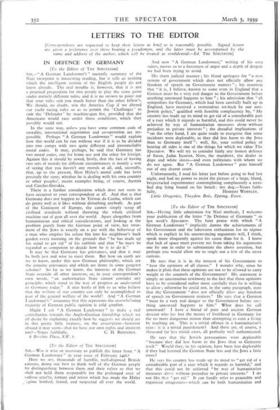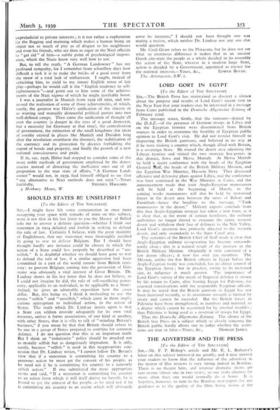[To the Editor of THE SPECTATOR] Sut,—Having little admiration for
Nazi methods, I welcome your publication of the letter " In Defence of Germany " rn last week's Spectator. The faint praise with which " A German Landowner " implicitly damns the achievements of his Government and the lukewarm enthusiasm for its regime which is explicit in his unconvincing arguments will, I think, speak more eloquently against his cause than for it. I know that lack of space must prevent me from taking his arguments one by one in order to substantiate the above assertion, but perhaps you would allow me to single out a few of the more curious.
He says that it is in the interest of his Government to " hear the opinions of all classes." I wonder why, since he makes it plain that these opinions are not to be allowed to carry weight in the counsels of the Government? His statement is simply an unconscious testimony to the fact that those opinions have to be considered rather more carefully than he is willing to allow ; otherwise he could not, in the same paragraph, state that the Government " does not officially allow any freedom of speech on Government matters." He says that a German " must be a very real danger to the Government before any- thing untoward happens to him." What does he call untoward? I have a friend of pure and ancient German descent who hat lost the means cf livelihood in Germany for the no more dangerous reason than attempting to earn a living by teaching art. This is a trivial offence in a humanitarian's eyes: is it a trivial punishment? And there are, of course, a thousand far less trivial cases, all perfectly well authenticated.
He says that the Jewish persecutions were deplorable " because they did less harm to the Jews than to Germany itself." Would they, in his opinion, have been less deplorable if they had harmed the German State less and the Jews a little more?
He says his country has made up its mind to " get rid of a considerable part of a race which it regards as harmful," and that this could not be achieved " by way of humanitarian measures alone without prejudice to private interests." I do not like that " get rid." It can hardly refer to peaceable and organised emigration—which can be both humanitarian and unprejudicial to private interests ; is it not rather a euphemism for the flogging and maiming which makes a human being an object not so much of pity as of disgust to his neighbours and even his friends, who are then as eager as the Nazi officials to " get rid " of him—a subtle point of psychological import- ance, which the Nazis know very well how to use.
But, to tell the truth, " A German Landowner " has my profound sympathy, for I remember from schoolboy days how difficult a task it is to make the bricks of a good essay from the straw of a total lack of enthusiasm. I ought, instead of criticising him, to yield to my innate English sense of fair play—perhaps he would call it the " English tendency to self- righteousness "—and point out to him some of the achieve- ments of the Nazi regime of which he might justifiably boast.
I was a journalist in Munich from 1929 till 1931, and wit- nessed the realisation of some of those achievements, of which, surely, the greatest was Hitler's unification of the sixteen or so warring and mutually distrustful political parties into two well-defined camps. Then came the unification of thought all over the country (a danger in the eyes of a good democrat, but a necessity for Germany at that time), the centralisation of government, the extinction of the small kingdoms (for ideas of royalty existed in places like Munich and Dresden long after the revolution overthrew the thrones), the stabilisation of the currency and its protection by decrees forbidding the export of bonds and property, and finally the growth of a new national consciousness and pride.
If in, say, 1936, Hitler had stopped to consider some of the more noble methods of government employed by the demo- cracies instead of distorting the ineffective ones out of all proportion to the true state of affairs, " A German Land- owner " would not, in 1939, find himself obliged to say that " any alternative to Nazi methods does not exist."—Yours



























































 Previous page
Previous page